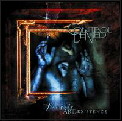|
The indelible legacy that Chuck Schuldiner left on the metal world
with his work in Death should be, at the very least, acknowledged
by anyone reading this review, but Control Denied is a portion
of this legacy that seems to go curiously underappreciated even
by many hardcore Death fans. I suppose it's mainly because Control
Denied marked the first time where Schuldiner seemed to be aspiring
more to a sound that was already in place rather than the relentless
innovation and progression he championed in Death. But while it
could be said that The Fragile Art of Existence is less pioneering
and groundbreaking than Death’s work, mistaking this as
a slight on its quality as an album would be a grave mistake indeed.
Control Denied’s lone release is still a great showcase
of Schuldiner’s incredible talents and a fantastic progressive/power
metal album in its own right.
The Fragile Art of Existence is, by and large, an exercise in
intense and dynamic progressive metal, and in many ways, it’s
the logical progression from Death’s swansong The Sound
of Perseverance. (For those who don’t know, some of the
material on that album was actually originally intended for Control
Denied.) The drumming, once again handled by the amazing Richard
Christy, retains much of its extreme-metal influenced speed and
technicality, and the riffing style reeks of the last couple of
Death albums, especially in Schuldiner’s distinctive blend
of traditional metal force and flavor with more melodically engaging
progressive elements. The big difference here is obviously the
clean operatic vocals, which are handled by none other than Tim
Aymar of Pharaoh fame. This was obviously the style Schuldiner
was heading towards with Death, and hearing Schuldiner’s
brilliant lyrics sung in this way is a wonderful treat, particularly
because they feel so well suited to the music at hand. Anyone
who’s heard Pharaoh is well aware of Aymar’s stellar
range and tone, and he keeps up with the more extreme and demanding
frameworks of Control Denied’s music with nary a hiccup
to be found.
Of course, this is probably another reason that The Fragile Art
of Existence tends to be slighted by Chuck fans: no screeching
Schuldiner vocals. But Schuldiner’s true voice—the
guitar—is given every opportunity to shine on this recording.
Songs like “What If…” feature classic Death-like
slowdowns and grooves interspersed with more atmospheric shredding
elements, while the classic “Expect The Unexpected”
and “When The Link Becomes Missing” reflect Schuldiner’s
abilities at contrasting progressive instrumentation with chorus
structures influenced from metal’s classic playbook. There’s
some awkward transitions and a few overblown moments peppered
throughout the tracks (the sudden slowdown in the beginning of
opener “Consumed” is particularly jolting), but by
and large, these are all fantastic songs, and much like all of
the latter-day Death albums, the individual performances are instrumentally
stunning. The tandem of Richard Christy on drums and Steve DiGiorgio
on bass provides the songs with an expertly performed and constantly
undulating rhythmic base that really allows the complexity of
Schuldiner’s hooks to shine through, and the production
does the compositions similar justice.
So there’s no doubt that, whether you’re a Death fan
or not, any fans of power and progressive metal owe it to themselves
to own this seminal release. But, for the already-converted, is
Relapse's re-issue worth the re-purchase? Sort of. Sound-wise,
the differences between the original and the re-master are pretty
negligible, but the bonus disc contains some interesting relics
that may make it worth forking up the cash again. Perhaps most
enjoyable and worthwhile for long-time Death/Control Denied fans
is the inclusion of the group’s untitled 1997 demo, which
features Chuck handling the power-oriented vocals on his own and
doing a pretty damn impressive job at it. While Aymar obviously
pulls off this vocal style with a little more confidence and flair
on the full-length, its pretty cool to hear Schuldiner tackle
the soaring vox on these songs himself. (Of course, we've already
heard him tear it up on Judas Priest's "Painkiller.")
Also included are some instrumental demos recorded shortly before
the album and a bizarre little comedy track recorded by Schuldiner
that should be good for a chuckle or two.
Regardless of whether or not this is your first exposure to Control
Denied, this re-issue should at least serve to garner some much-deserved
attention to this surprisingly unheralded release, and that’s
a good thing. The Fragile Art of Existence is an excellent listen
for both Death fans and prog/power fanatics, so if you’ve
been waiting for an excuse to finally check this album out, now’s
the ideal time to take the plunge.
Rating: 9,4
|

